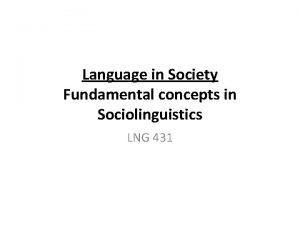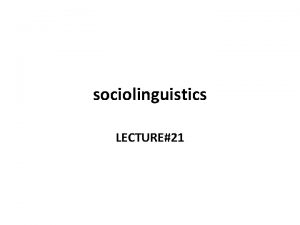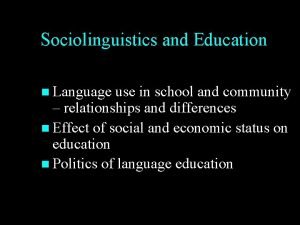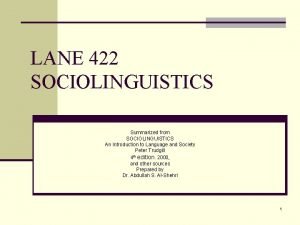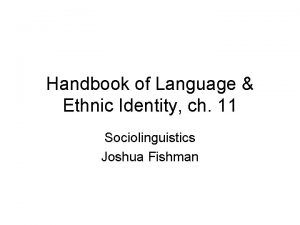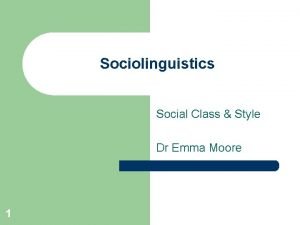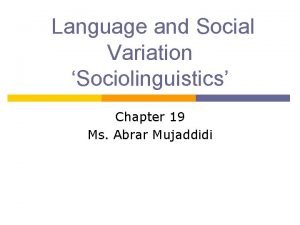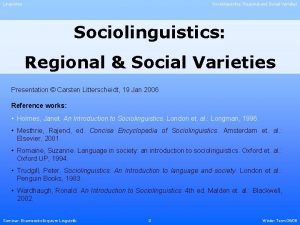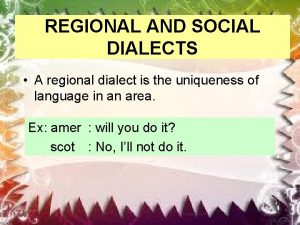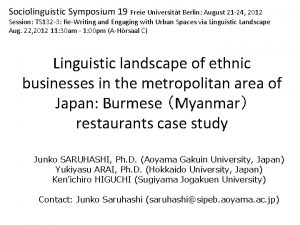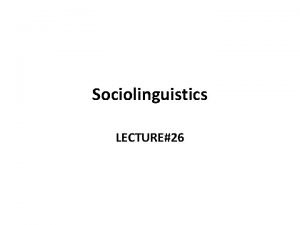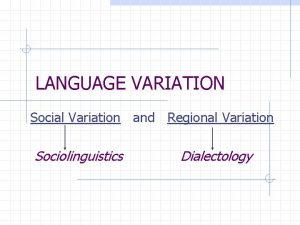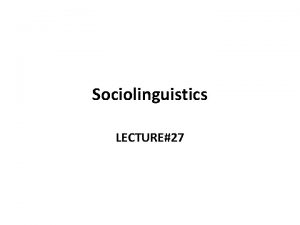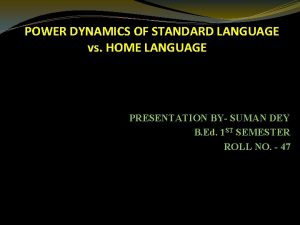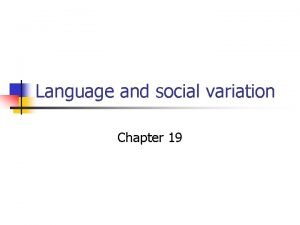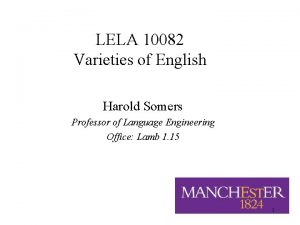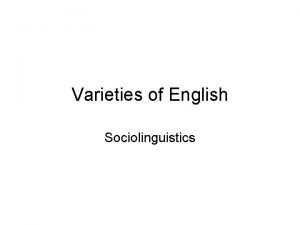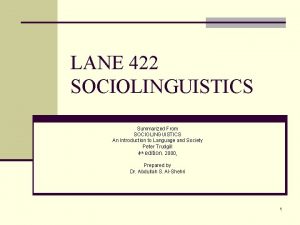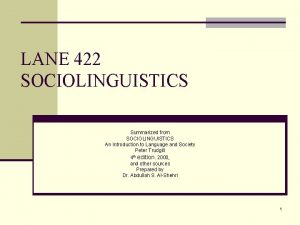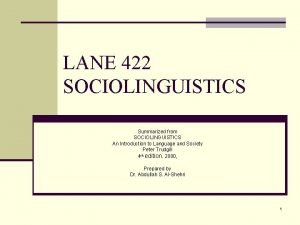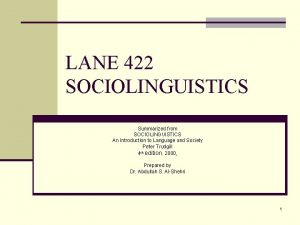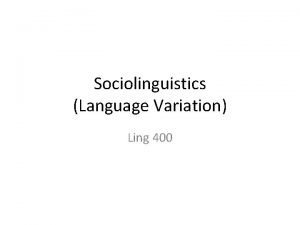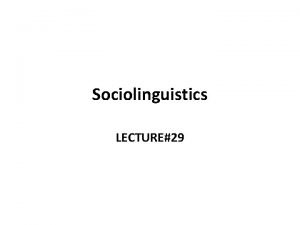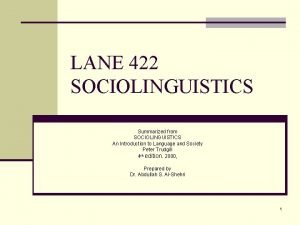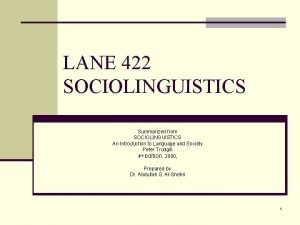What is sociolinguistics Sociolinguistics The study of the



















- Slides: 19

What is sociolinguistics? • Sociolinguistics: The study of the interrelationships between language and social structure; centrally concerned with how language varies (at a single point in time) and changes (over time) according to how people in society use it.

Sociolinguistics is the study of variation of language in use – we use different words or grammatical forms depending on context.

What is the scope of sociolinguistics? • identify aspects of socioeconomic factors in language variation • identify aspects of gender and ethnicity as factors in language variation • describe how shifts in speech contexts cause changes in speaking styles • list the reasons why “standard” national dialects are problematic propositions

What do sociolinguists study? • What is Sociolinguistics? • The term refers to the study of the relationship between language and society, and how language is used in multilingual speech communities.

• What aspects of language are Sociolinguists interested in?

• Sociolinguists are interested in explaining why people speak differently in different social contexts. • They study the effect of social factors which include: 1. social distance, 2. social status, 3. age, 4. gender, 5. Class, on language varieties (dialects, registers, genres, etc), and they are concerned with identifying the social functions of language and the way they are used to convey social meanings.

• What do sociolinguists mean by the term variety?

• A variety is a set of linguistic forms used under specific social circumstances.

Variation is determined by social class, gender, place, age, situation etc. Would you use the same words, syntax and phonology (or even the same language) to ask for a loan from a friend, father, mother, bank, total stranger?

• Formality increases between participants (speaker and hearer) when the social distance is greater. • Informality (Solidarity) increases when the social distance is little between participants (speaker and hearer).

* Social status depends on a number of factors such as social rank, wealth, age, gender and so on; therefore the person with the higher social status has the choice of using formality or informality (solidarity) when addressing other persons of lower social status. But the person with the lower social status uses only formality when addressing a person of higher social status.

Reviewing Basic Terms • sociolect: social variety • language: “The systematic, • accent: characterised by conventional use of sounds, pronounciation signs, or written symbols in human society for • register: occupational communication and self varieties expression. ” • style: varieties according to formality of situation • variety: Most neutral term, can be used for all the others • dialect: regional variety

Language and Dialect n n n Language and Dialect are ambiguous terms (Haugen 1966) “these terms represent a simple dichotomy [contrast] in a situation that is almost infinitely complex” Language can be used to refer either to a single linguistic norm or to a group of related norms, and dialect to refer to one of the norms.

Language variation • No two speakers of a language speak exactly the same way • No individual speaker speaks the same way all the time

Dialect • A variety of a language spoken by a group of people that is characterized by systematic features (e. g. , phonological, lexical, grammatical) that distinguish it from other varieties of that same language • Idiolect: the speech variety of an individual speaker

Language = a continuum of dialects Language dialect C dialect A dialect B

Dialect = a continuum of idiolects Dialect A idiolect C idiolect A idiolect B

Dialects q. Dialects are structurally inferior to languages, lacking formal grammatical rules and standards of speaking; q. Dialects are communicatively inferior to languages, lacking the full range of expressibility found in a formal language; q. Dialects are orthographically inferior to languages, lacking their own system of writing; q. In short, dialects are inferior to languages. q FACT: Everyone speaks a dialect

Regional dialect • A regional dialect is a distinct form of a language spoken in a particular geographical area. • Regional dialect is a variety of language that is spoken in a geographical area. • It features differences in pronunciation, in the choices and form of the word, and syntax.
 Fundamental concepts of sociolinguistics
Fundamental concepts of sociolinguistics Frozen register
Frozen register Sociolinguistic variation
Sociolinguistic variation Sociolinguistics and education
Sociolinguistics and education What is sociolinguistics
What is sociolinguistics Ethnicity in sociolinguistics
Ethnicity in sociolinguistics What is overt prestige
What is overt prestige Social dialect
Social dialect Social variation
Social variation Example of sociolinguistic competence
Example of sociolinguistic competence What is a regional dialect
What is a regional dialect Malihka burmese restaurant
Malihka burmese restaurant Code switching in sociolinguistics
Code switching in sociolinguistics Language variation
Language variation Language and dialect in sociolinguistics
Language and dialect in sociolinguistics What language you speak at home
What language you speak at home Sociolinguistics slideshare
Sociolinguistics slideshare Social variation
Social variation Idiolect in sociolinguistics
Idiolect in sociolinguistics What is sociolinguistics
What is sociolinguistics
